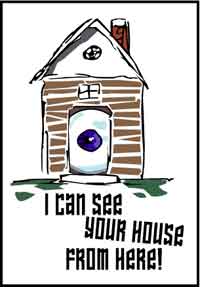
I Can See Your House From Here - Archives
vol 2 number 9
This is a week that I am glad to be a comic book reader.
Yesterday, the new books for the week hit the comic store as they do every Wednesday. Normally, I would have written up a couple of reviews for the site, but not this week. It was really just too much.
For instance, in The Adventures of Superman #596, on page two, there is one of the most eerie panels I've ever seen: Superman hovers in the air, looking up at the Metropolis (DC's version of New York City) twin towers - analogous to the World Trade Center's Twin Towers. Both have suffered massive destruction to their upper floors.
In Transmetropolitan #49, there's a McVeigh High School - entirely ironic, and very funny in context, but strange synchronicity, to say the least.
There are others, but you can pick the books up yourself if you're interested. I just found it to be too much, trying to read the stories from a reviewer's seat; every time I'd find myself in the groove, I would run across something else that would remind me of what happened in Manhattan. I read comics - and have for many years - to get away from the real world, and this wasn't working.
So, for the most part, the comics have been put aside, waiting for later reading. I want to enjoy them like I enjoy books that come out during normal weeks. I will say, though, that the aforementioned Superman book is a good book to pick up this week. It deals with the aftermath of a huge war, and is really inspirational. I hope Joe Casey and Mike Weiringo aren't fretting too much about the precognizant panel, because the rest of the story is perfect for this week, good coincidental timing.
* * * *
I know that there are a lot of you that don't read comics, and even more that don't read the X-Men line of books. But there's an important message in those books, at their core, that applies nicely to this situation.
The book was, at least in the Stan Lee days, a metaphor for racism. The heroes are mutants, the next step in the evolution of humanity; of course, so are the villains. The trick is that the heroes are hated by the general public as much as the bad guys are, by sole virtue of their being mutants. Even facing public scorn and even violence, they struggle on, protecting a world that fears and hates them.
Originally, the appeal of the book for kids was that the X-Men were outcasts, much like most of the kids that read comics, but nevertheless they were still good guys. They fought the good fight, they did the right thing, and carried on, hoping that one day homo sapiens would accept them as equals.
No one would argue that the X-Men are bad guys. Yes, they are different from the rest of 'us.' Yes, there are bad mutants, mutants that do evil things like blow up buildings and hold governments hostage with threats of terrorism. But the X-Men can't be judged based solely on their DNA, the things that make them different; we see them as heroes because of their actions.
We would do well to remember that.
* * * *
I used to wonder as a kid what the world would be like with superheroes - people that could really fly, or stick to walls, or run at the speed of light. In my head, that was a beautiful world, much more exciting than the suburban small town life I was living.
As I got older, I still held on to that fantasy; that changed on Tuesday, when I realized that catastrophic things would happen more often. In comics, the good guys always save the day, but what they don't show is the lives that are lost in the battles, or before the good guys arrive.
Recently, Warren Ellis showed something along such lines in his early issues of The Authority. It never really affected me until today, when I thought about it for this column; up until today, I never had an emotional point of reference for such a thing.
Frankly, now that I've experienced the kind of destruction that happens all the time in comics, I'll stick with the real world. I'll always dream of flying, or being able to lift mountains, but dreams are good things to have.
Besides, it occurs to me that we do have superheroes. There are police and doctors and volunteers sifting through the rubble, trying to find survivors. There are firefighters who risked and gave their lives helping people in Manhattan. There are the soldiers that guard our country everyday, and that offer their safety and well being to protect our freedoms. There are normal, everyday people - people that could have been you and me - that took a chance and tried to fight the hijackers on the airplane that went down in Pennsylvania, potentially saving thousands of lives with their bravery and ultimate sacrifice.
They don't need uniforms, but they do deserve recognition.
